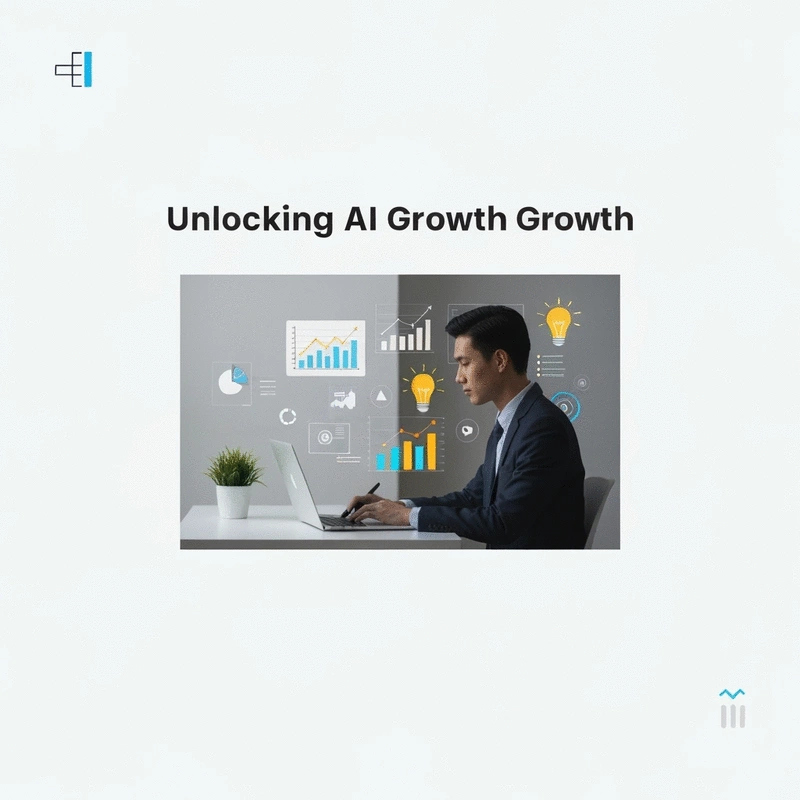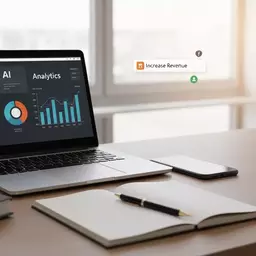AI Growth Pathway: Lead to Revenue

Are you ready to transform your business using the power of artificial intelligence? As AI tools continue to evolve, understanding their potential from lead generation to revenue maximization becomes imperative. This journey could be the key to unlocking new growth opportunities for your business.
What You Will Learn
- AI serves as a transformative force, streamlining operations and enhancing customer engagement.
- An integrated approach ensures all business functions work cohesively with AI, driving holistic growth.
- Effective lead generation and customer retention strategies can significantly boost your revenue.
- Continuous learning and adaptation are crucial for maximizing AI's impact on your business.
The AI Growth Pathway: From Lead Generation to Revenue Maximization
This visual illustrates the comprehensive journey of AI integration, from initial lead generation to the ultimate goal of revenue maximization, highlighting key stages and strategic focus areas.
1. Understanding AI in Business Growth
- • Automation of tasks
- • Enhanced data analysis
- • Personalized experiences
2. Integrated AI Approach
- • Holistic growth
- • Consistent user experience
- • Data-driven decisions
3. AI for Revenue Maximization
- • Enhanced lead generation
- • Improved customer retention
- • Streamlined sales processes
4. Continuous Learning & Adaptation
- • Workshops & seminars
- • Online courses
- • Networking with peers
Understanding the AI Growth Pathway: From Lead Generation to Revenue Maximization
As a business strategist, I've seen firsthand how the adoption of artificial intelligence can reshape the pathways to growth for small and medium-sized businesses. At My AI Business Coach, we empower business owners to leverage AI tools that drive efficiency and boost revenue. But to truly harness the potential of AI, we must first understand its role in each step of the growth journey—from generating leads to maximizing revenue.
AI is not just a buzzword; it's a transformative force in the business landscape. By integrating AI into your operations, you can streamline processes, enhance customer engagement, and ultimately, increase profitability. Let's break down what this means for your business.
Defining AI in the Context of Business Growth
In the realm of business, artificial intelligence refers to systems that simulate human intelligence to perform tasks and analyze data. This technology is designed to mimic cognitive functions like learning, problem-solving, and decision-making. As you explore AI, consider these key aspects:
- Automation: AI can handle repetitive tasks, freeing up your team for more strategic initiatives.
- Data Analysis: AI tools can process vast amounts of data to extract insights that inform business decisions.
- Personalization: AI enables tailored customer experiences, enhancing engagement and loyalty.
Understanding these components is essential as you embark on the journey to integrate AI into your business model. It’s about working smarter, not harder! The UK government's 2023 AI sector study provides further insights into the broad applications and economic impact of AI.

The Importance of an Integrated Approach
To truly maximize the benefits of AI, it’s crucial to adopt an integrated approach. This means ensuring that all your business functions operate cohesively with AI at the core. Here’s why:
- Holistic Growth: An integrated strategy allows for seamless communication across departments, enhancing overall efficiency.
- Consistent User Experience: Maintaining alignment between sales, marketing, and customer service ensures a unified brand message.
- Data-Driven Decisions: When all functions utilize AI insights, your decision-making becomes more informed and effective.
By committing to an integrated AI strategy, you position your business for sustained growth as you navigate the complexities of today’s market. For a deeper understanding of how AI is being adopted across sectors, including government, consider reading about the evolution of AI spending by the U.S. government.
Exploring the Role of Artificial Intelligence in Revenue Maximization
At My AI Business Coach, we believe that the ultimate goal of AI implementation is to drive revenue. This is achieved through:
- Enhanced Lead Generation: AI tools can pinpoint high-potential leads, optimizing your marketing efforts.
- Improved Customer Retention: By analyzing customer behavior, AI helps create strategies that keep clients engaged.
- Streamlined Sales Processes: Automation of sales tasks allows your team to focus on closing deals.
Effective use of AI in these areas can lead to significant revenue growth and operational efficiency. As you dive deeper into AI, keep these points in mind to maximize your return on investment.
Pro Tip
To maximize the effectiveness of your AI tools, consider integrating them with your existing CRM systems. This ensures that the insights generated by AI are seamlessly incorporated into your sales and marketing strategies, enhancing customer interactions and fostering long-term loyalty.
Frequently Asked Questions About AI in Business Growth
What is the "AI Growth Pathway"?
The AI Growth Pathway is a comprehensive journey of integrating AI into business operations, starting from lead generation and progressing to revenue maximization. It highlights key stages and strategic focus areas for leveraging AI for sustained growth.
How does AI contribute to business growth?
AI contributes to business growth by automating tasks, enhancing data analysis for informed decision-making, and enabling personalized customer experiences, all of which streamline operations and boost profitability.
Why is an integrated approach to AI important?
An integrated approach ensures that all business functions work cohesively with AI, leading to holistic growth, consistent user experiences across departments, and more effective data-driven decisions.
What are the key ways AI can maximize revenue?
AI maximizes revenue through enhanced lead generation by pinpointing high-potential leads, improved customer retention by analyzing behavior to create engagement strategies, and streamlined sales processes through automation, allowing teams to focus on closing deals.
What does "continuous learning and adaptation" mean in the context of AI strategies?
"Continuous learning and adaptation" refers to the ongoing process of regularly revisiting and refining AI systems and strategies as AI tools and methodologies evolve. It involves staying updated through workshops, online courses, and networking to ensure AI implementation remains effective and innovative.
Summarizing the AI Growth Pathway: Key Takeaways
As we wrap up our discussion on the AI growth pathway, it's vital to recognize the comprehensive journey from lead generation to revenue maximization. This pathway isn’t just a checklist; it's a roadmap that aligns your business goals with the power of artificial intelligence. Each step, from identifying potential leads to nurturing them into loyal customers, plays a crucial role in enhancing your profitability.

To ensure you’re on the right track, here are the key steps we've explored:
- Understanding the role of AI in business growth
- Implementing lead generation strategies that leverage predictive analytics
- Optimizing your sales funnel with data-driven insights
- Aligning sales and marketing through integrated AI strategies
- Measuring ROI effectively using relevant KPIs
By following these steps, you can create a more streamlined process that maximizes revenue and fosters sustainable growth.
Encouraging Continuous Learning and Adaptation in AI Strategies
One of the most exciting aspects of AI is its ever-evolving nature. I always advocate for a mindset of continuous learning. As AI tools and strategies advance, so should your approach. This means regularly revisiting your AI systems and learning from the data they generate. It’s important to remain adaptable and open to new methodologies that can enhance your business.
Here are a few ways to foster a culture of continuous improvement in your organization:
- Attend workshops and seminars focused on AI and business strategies
- Engage with online courses to deepen your understanding of AI applications
- Network with other business owners to share insights and experiences
By committing to ongoing education, you not only enhance your skills but also ensure your business thrives in this dynamic landscape. The Berkeley Haas Center for Responsible Business offers valuable insights into the adoption of AI and agentic systems, including their value, challenges, and pathways for implementation.
Next Steps for Implementing AI in Your Business
Now that you have a solid understanding of the AI growth pathway, it's time to take actionable steps toward implementation. At My AI Business Coach, we’re here to help you navigate this transition smoothly and effectively.
Your first step should be to create a tailored AI growth plan that aligns with your organizational goals. Consider your specific challenges and how AI can address them. Here’s a straightforward guide to help you get started:
- Assess your current business processes to identify pain points
- Determine which areas could benefit most from AI integration
- Develop a strategic plan outlining the AI tools and technologies you aim to implement
Once you have a plan in place, the next step is to engage with AI experts who can provide you with customized strategies tailored to your unique business needs.
Engaging with AI Experts for Customized Strategies
Working with professionals who specialize in AI can make a significant difference in your success. These experts can offer insights that go beyond generic advice, helping you leverage AI tools effectively.
To make the most of this collaboration, consider:
- Discussing specific objectives and desired outcomes with your consultant
- Reviewing case studies that illustrate successful AI implementations
- Establishing a feedback loop to measure progress and adapt strategies as needed
By partnering with the right experts, you’ll be better equipped to harness AI for your business transformation.
Exploring the Impact of Digital Transformation on Business Processes
The final step involves understanding how digital transformation, driven by AI, can reshape your business processes. It’s about more than just adopting new technology; it’s about rethinking how your business operates at every level.
Here are some key aspects to consider:
- The importance of customer-centric approaches fueled by AI insights
- How automation can streamline operations and reduce costs
- The role of data analytics in driving informed decision-making
As you explore these impacts, remember that embracing digital transformation is a journey, not a destination. Stay proactive and continue to look for innovative ways to integrate AI into your business for ongoing success!
Recap of Key Points
Here is a quick recap of the important points discussed in the article:
- Understand the role of AI in driving business growth and efficiency.
- Adopt an integrated approach for seamless communication across business functions.
- Utilize AI tools for enhanced lead generation and improved customer retention.
- Streamline sales processes through automation for better focus on closing deals.
- Foster continuous learning to adapt AI strategies for ongoing improvement.
- Engage with AI experts for customized strategies that align with your business goals.
Popular Posts
 Have you ever wondered how artificial intelligence can reshape consumer behavior and decision-making
Have you ever wondered how artificial intelligence can reshape consumer behavior and decision-making
 As the digital landscape evolves, small businesses are discovering that artificial intelligence is n
As the digital landscape evolves, small businesses are discovering that artificial intelligence is n
 Did you know that personalized marketing can lead to a revenue increase of up to 30%? In an era wher
Did you know that personalized marketing can lead to a revenue increase of up to 30%? In an era wher
 Are you aware that reactivating dormant customers can significantly enhance your business growth? Ma
Are you aware that reactivating dormant customers can significantly enhance your business growth? Ma
